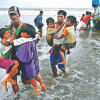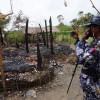Shared food, homes for some refugees
"They pushed me away. I couldn't even fight back because I had my baby with me and he could have gotten hurt," Shanwara Begum in her mid-twenties says, her arm wrapped around her two-year old boy. Her eyes are a rare light shade of blue. They might have sparkled once; now they are dull.
Shanwara, a Rohingya refugee at Kutupalong camp in Cox's Bazar, came here five days ago. Today, she went for relief meant for the newcomers. But it was not to be. "Those who have been here for years are managing to get most of the relief. They know where to go and how to get it," she says.
Shafiq Alam, another new refugee who looked younger than his claimed 65, agreed. "They pushed her away and I could not get through either. What can we say? We are not here to fight," he expressed his frustration.
Nur Mohmmad Reshad, a living in Kutupalong Refugee Camp, who claimed to have come here 39 years ago, had a different story to tell. "Those of us who have been living here for so many years understand their trouble. We have all opened our homes to them. We share all our food with them," he said.
"Whatever we get, we share with them and sometimes keep less for us because they need it more now," he adds.
Pointing at various homes, madrasas and schools, he showed how each of them was now hosting individuals who had just crossed the border.
He agreed with Shanwara's story but he said everyone there was in need and those with identity cards got the aid easier.
As authorities, UN agencies and NGOs struggle to cope with an influx of over 3 lakh Rohingya refugees, in addition to the previous 5 lakh, providing enough aid is their main worry now. The huge number of people means that there is not enough of it and the long time Rohingyas here make sure they get to the aid first.
Some Locals welcome the Rohingyas
Meanwhile, some locals have started to organise to help the new refugees. While the government is planning biometric registration, they are finding their own ways of identifying the new refugees and providing the basic necessities to them.
Locals from Cox's Bazar and as far as Chittagong have taken it upon themselves to bring essentials to the Rohingyas. In almost every camp or locality with refugees, locals are distributing food, water, plastic sheets and clothing items.
Maulana Ashraful Mostafa from Ukhia is one such man leading a four-man team in Balukhali providing clothes, money, biscuits and dry food to the refugees. A teacher of a local madrasa, Mostafa believes this his duty as a human being.
Travelling in a loaded pick-up truck with these items, he goes from place to place and hands out the items to the needy. "We saw news of the refugees and decided that we had to help. Nearby residents came together and donated all of this," he said. "Along with the clothes and food, we are giving them some money too,"
In another location, Selim Jahangir, a former member of the Ukhia upazila and BNP joint-secretary of the area, is currently sheltering 2000 Rohingya women in his under-construction house in Balukhali.
"We found these women with children. Their husbands were not with them so we brought them here. We have given them tokens so we can identify who has gotten the relief and who hasn't," he says. He said he went around the new settlements and make-shift camps and selected those needing relief the most.
"I am putting them up in my house so they can all be at one place. I am giving them the relief packages the Bangladesh Army has prepared," he adds.
Each relief packet contains half kg lentil, one dozen candles, seven kgs rice, potatoes and one matchbox.
But he has his concerns too. "I'm from here and these people are guests so we must help. But I have to say that something more needs to be done for them. The Rohingyas are pushing the labour price down and now the locals are finding it difficult to survive," he added. He also pointed out that the large numbers, open defecation and littering are hurting the environment and again stressed for more organised planning.
Meanwhile, relief materials aren't the only things locals are offering. Mizan, a resident of Naopara, is literally lending his hand. The self-employed 29-year-old says he visits the border point every other day. "The people crossing over need our help. Yesterday, an old man crossed the river and collapsed. I carried him to a doctor at Kutupalong," he says. The man was reunited with his son later, he adds.
Like Mizan, there are many other locals milling around the refugees and offering help wherever possible, setting up homes, buying them necessities or just listening to their harrowing tales. The refugees are not hesitant to talk and are willing to open up to anyone listening.

 For all latest news, follow The Daily Star's Google News channel.
For all latest news, follow The Daily Star's Google News channel. 








Comments